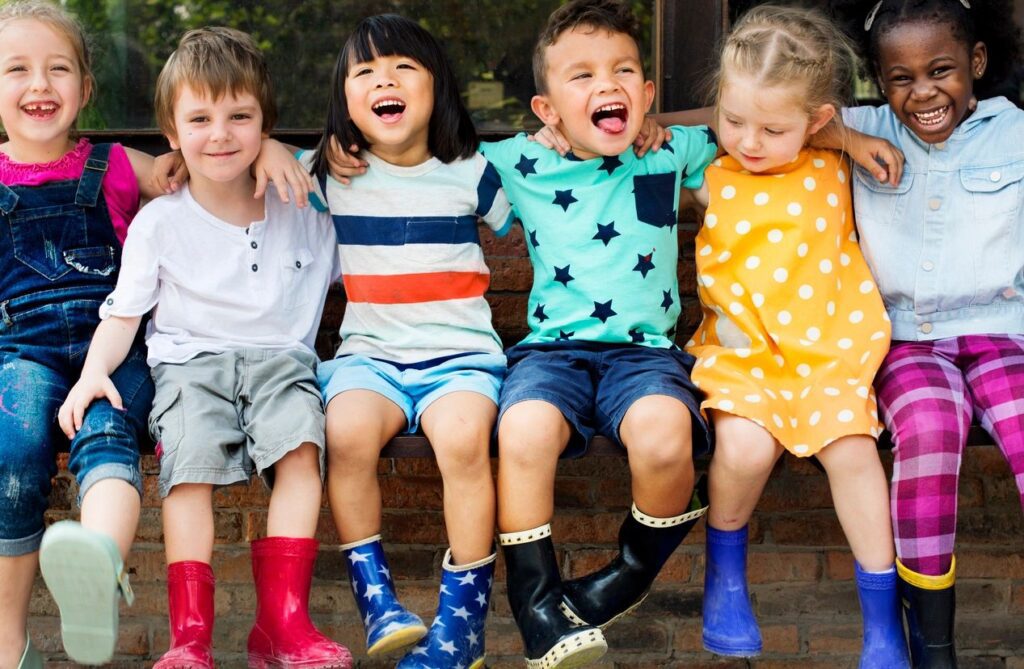by Sara Riggle, MSSW, LSW
As parents, how can you support your kids to develop healthy and positive relationships? It can be really challenging for parents. When your child was born, you weren’t given a handbook for some of the difficult challenges. Even if you were–what works for one of your kids is vastly different than what works for your other kids. Not to mention, most parents are still working through their own relationship challenges in their adult lives.
Learning how to build positive relationships is crucial for a child’s emotional well-being and social development. As a Social Worker, here are some effective strategies to help your kids cultivate meaningful connections with friends.
Teach Empathy and Emotional Intelligence
The first step is to simply help kids understand and identify (naming) their emotions. When your brain can name or understand a feeling, it actually reduces the intensity of that feeling. As a parent, you can actually help naming their feelings, ‘You look sad.” “Are you feeling frustrated right now?” “You seem really excited!” For younger kids, you can also try using a visual “Feeling Faces” chart. Make a game out of it. Point to the feeling you are experiencing and ask them to point to theirs. Once kids have a grasp of their emotions, you can help guide them to recognize how others might be feeling, cultivating empathy. Empathy and compassion are the foundations for making positive connections with other friends.
Promote Effective Communication Skills
Effective communication is the cornerstone of any healthy relationship. Encourage children to express themselves clearly and actively listen to their peers. Teach them the importance of using “I” statements to express feelings and needs without blaming others (i.e. “I feel emotion word when explanation of feeling”). Additionally, role-playing scenarios can be an effective tool for practicing communication skills in a safe and supportive environment, such as using a dollhouse, stuffed animals, or puppets.
Encourage Inclusivity and Cooperation
Foster a sense of inclusivity by emphasizing the value of diversity and the uniqueness of each individual. Help children understand that everyone has different strengths and abilities, and that collaboration often leads to stronger outcomes. Group activities that promote teamwork and cooperation can enhance their understanding of shared goals and mutual respect. Engaging children in sports, dance, religious activities, volunteering, etc. where they’re expected to work with other peers is beneficial!
Develop Social Skills through Play
Play is a powerful medium through which children learn and practice social skills. Encourage activities that involve cooperation, turn-taking, and problem-solving. Board games, team sports, and group projects provide opportunities for children to engage with their peers in a structured and enjoyable manner, fostering positive interactions. Listed below are some recommended games.
Address Conflict Resolution
Conflict is a natural part of any relationship. Equip children with the skills to resolve conflicts peacefully and constructively. Teach them the importance of compromise, active listening, and finding common ground. Model effective conflict resolution techniques in your home and guide them in practicing these skills during role-playing exercises. If you and your spouse resolve a conflict in a calm and respectful fashion, your children will likely follow your example. Remind your children that people can have differences but still get along with each other.
Promote Self-Esteem and Confidence
Children with positive self-esteem are more likely to form successful peer relationships. Encourage activities that highlight their strengths and accomplishments. Acknowledge their efforts and provide constructive feedback to build a foundation of confidence, enabling them to navigate social situations with greater ease. A fun way to build self-esteem is to leave affirmation notes on the bathroom mirror or in their bedroom and have them practice reading them aloud to themself. A list of affirmation phrases is listed below!
Foster a Supportive Environment
Create an environment that promotes positive interactions and a sense of belonging. Emphasize the importance of kindness, respect, and understanding. Encourage children to celebrate each other’s successes and offer support during challenging times. A supportive environment can significantly impact a child’s ability to form lasting, positive peer relationships. In guiding children towards building positive peer relationships, parents play a pivotal role in shaping their social development. By focusing on empathy, communication, inclusivity, social skills, conflict resolution, and self-esteem, parents can empower children with the tools they need to navigate the complexities of interpersonal connections successfully. Ultimately, fostering positive peer relationships lays the groundwork for a child’s overall well-being and contributes to their lifelong journey of building meaningful connections with others.
Here are some books and resources that can help teach your kiddos social skills:
- Let’s Play! A Book About Making Friends by McCardie, Amanda
- How to Spot a Best Friend: Birdsong, Bea, Fleming, Lucy: 9780593179277: Amazon.com: Books
- I Forgive Alex: A Simple Story About Understanding – Kindle edition by KERASCOET, Cosset, Sebastien, Pommepuy, Marie. Children Kindle eBooks @ Amazon.com.
- How to Apologize: LaRochelle, David, Wohnoutka, Mike: 9781536209440: Amazon.com: Books
- The Not-So-Friendly Friend: How To Set Boundaries for Healthy Friendships: Christina Furnival, Katie Dwyer: 9781683734260
- https://www.therapistaid.com/worksheets/printable-emotion-faces (Feeling Faces Chart)
- Games: Candy Land, Guess Who, Don’t Break the Ice, Jenga, Hedbanz, Charades, Connect Four, Battleship, Checkers
- https://cosmickids.com/positive-affirmations-for-kids/ (Affirmations for Self-Esteem)
About Sara Riggle, MSW, LSW
Sara has experience working with a wide range of populations through her work in an inpatient facility, outpatient community mental health agency, and a private practice working with children and adolescents.
She is a therapist specializing in providing compassionate and effective mental health support to individuals across the lifespan. With a passion for helping individuals overcome life’s challenges and achieve their full potential, she has devoted her career to creating a safe and nurturing space for personal growth and emotional well-being.
Sara is accepting new clients and would love to help support your child!






